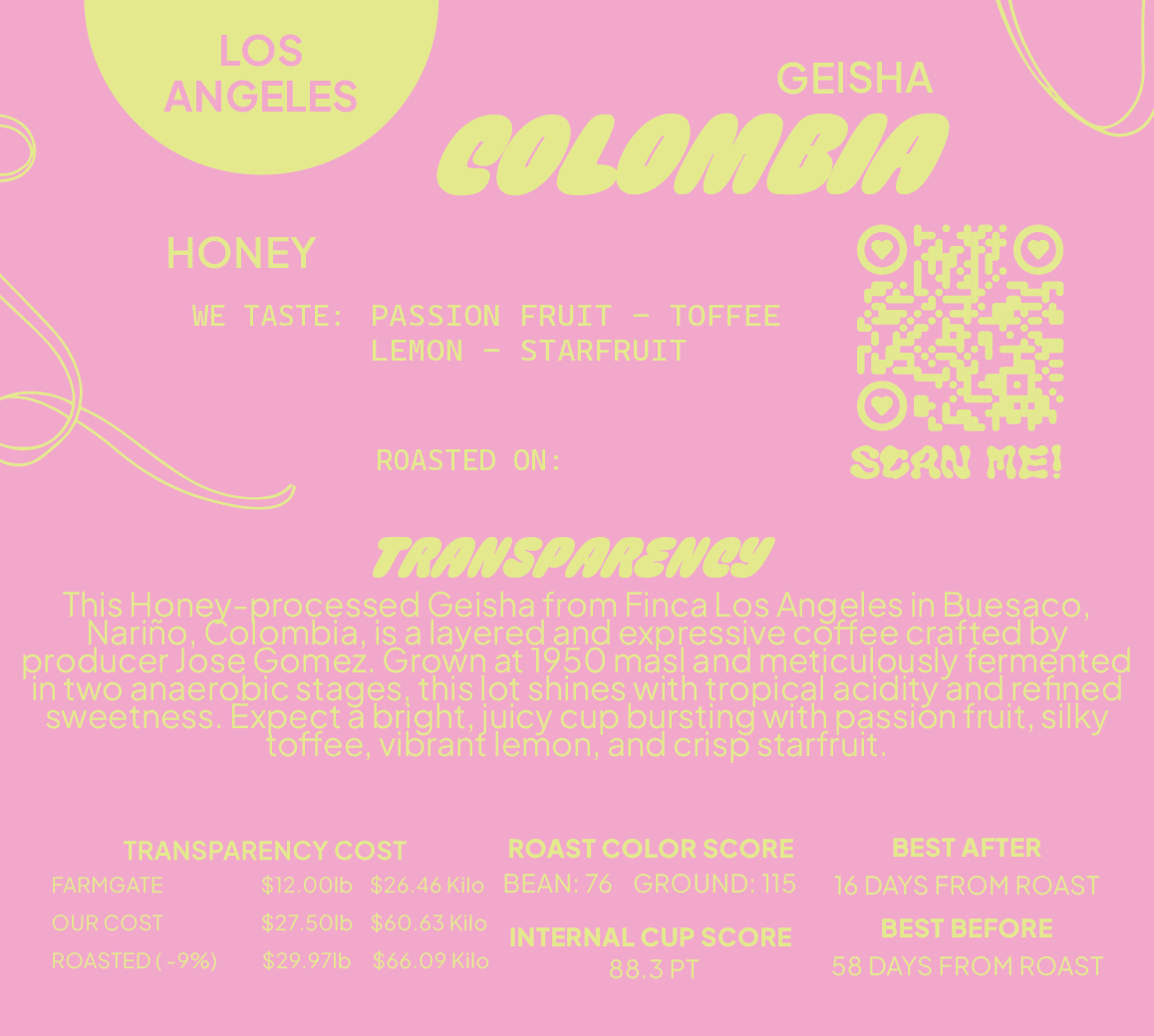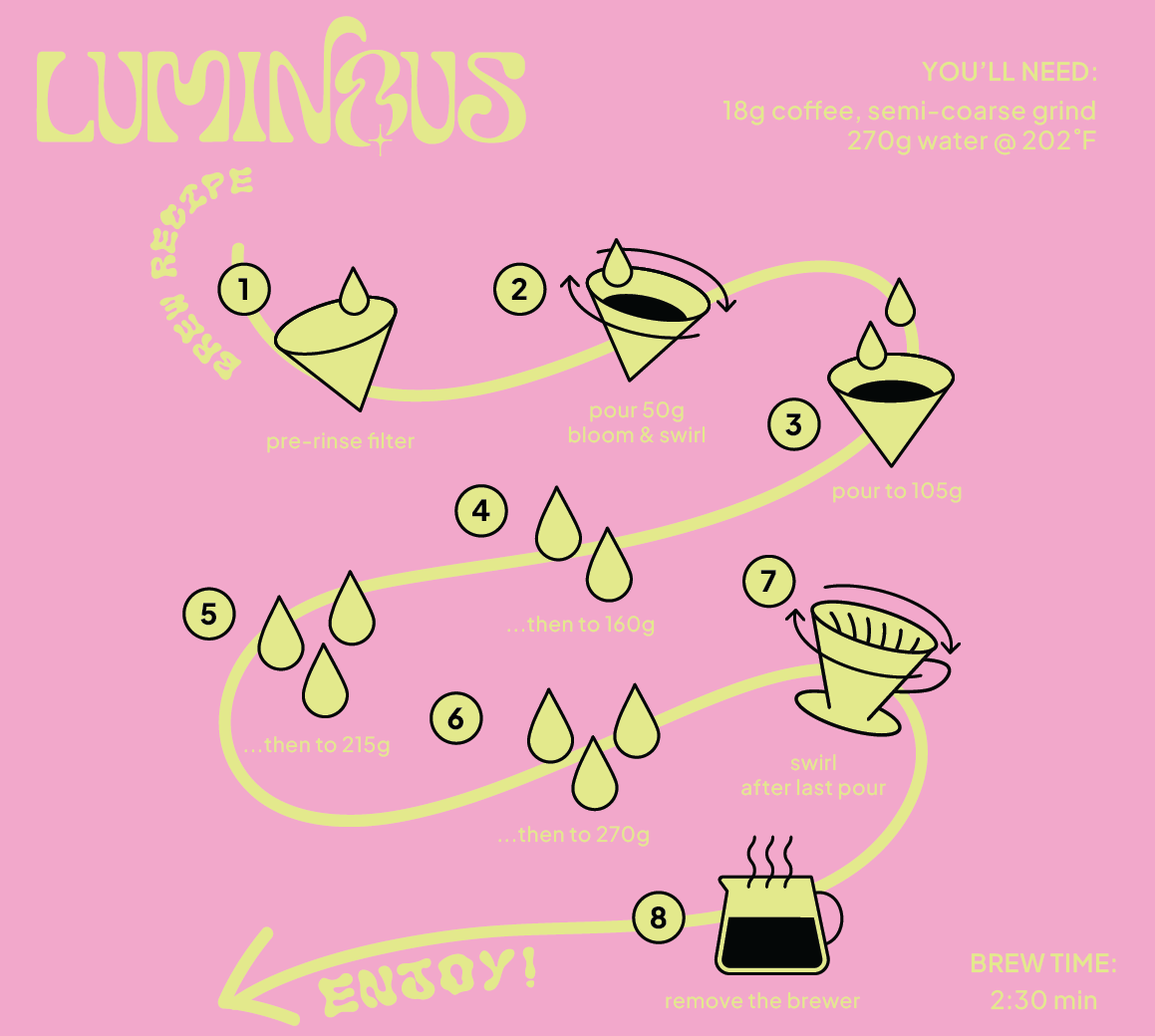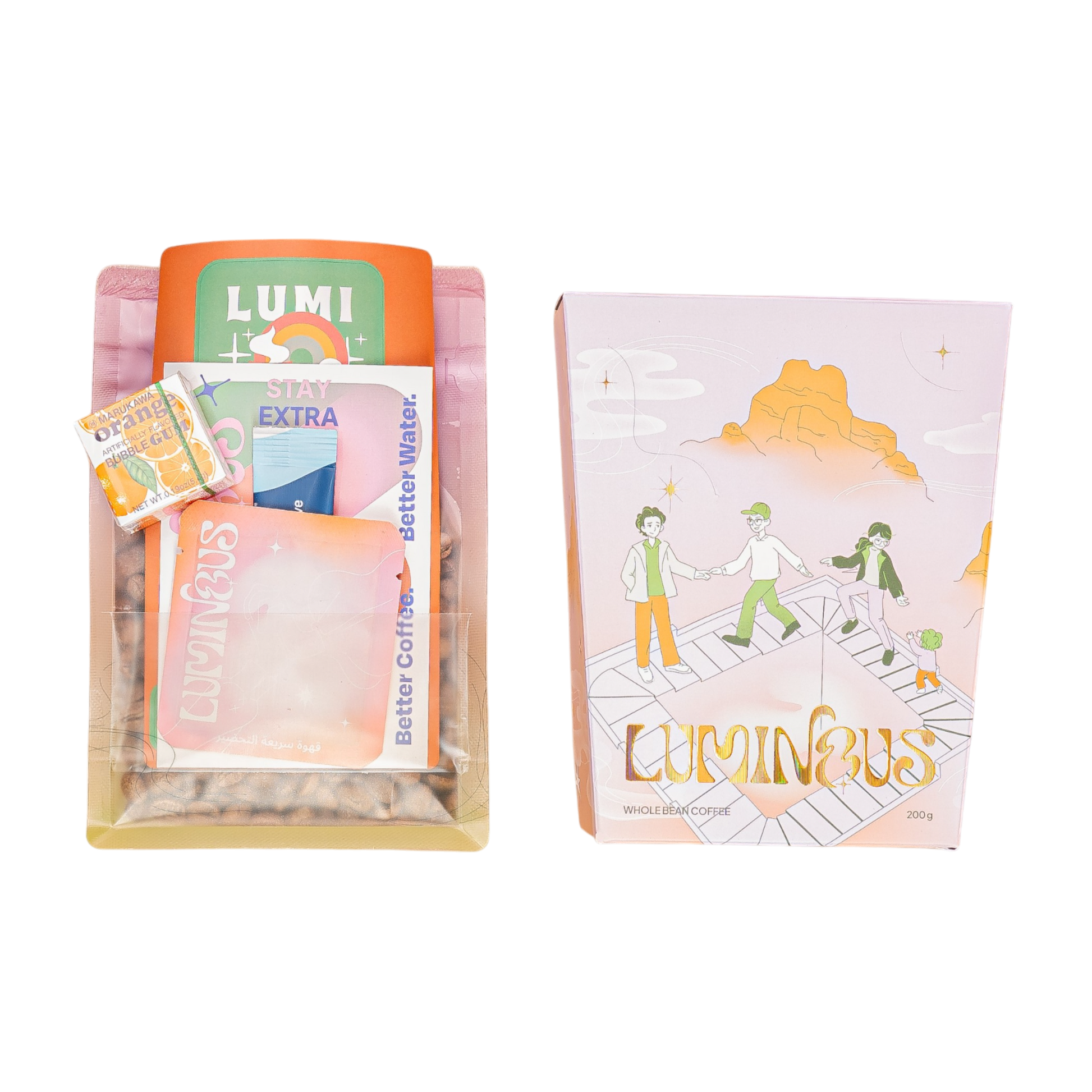


كولومبيا قيشا – معالجة عسلية من مزرعة لوس أنجلِس
من مرتفعات بويزاكو في إقليم نارينيو الكولومبي ⛰️ وعلى ارتفاع 1950 مترًا عن سطح البحر، تأتي هذه القهوة من صنف قيشا النادر 🌸، أبدع في إنتاجها المزارع خوسيه غوميز.
خضعت لمعالجة عسلية مع مرحلتين من التخمير اللاهوائي المتقن، ما أكسبها حلاوة راقية وحموضة استوائية مشرقة.
يقدّم هذا المحصول فنجانًا عصيري المذاق، نابضًا بنكهات فاكهة العاطفة 🥭✨، والتوفي الناعم 🍬، والليمون الزاهي 🍋، ونجمة الفاكهة المنعشة ⭐🍏.
إنها شهادة حية على إرث خوسيه العائلي وابتكاره في أساليب التخمير، حيث تتجلى الوضوح والتميّز في كل رشفة.
What's included in each experience
TAKEOUT BOX - ALL THE EXTRAS
The Takeout Box comes with:
- A 200-gram bag of coffee
- One fortune cookie or Hi-Chew
- A few stickers
- One packet of instant coffee
- One custom brewing water packet from Third Wave Water
- A detailed coffee card
JUST A BAG
This option contains:
- One 200-gram bag of coffee
- One instant coffee packet
- One detailed coffee card
1 KILO BAG
This option contains:
- One 1000-gram bag of coffee
- Two instant coffee packets
- One custom brewing water packet from Third Wave Water
- One detailed coffee card
2 KILO BAG
This option contains:
- One 2000-gram bag of coffee
- Two instant coffee packets
- One custom brewing water packet from Third Wave Water
- One detailed coffee card
Coffee info
Location: Buesaco, Nariño
Country: Colombia
Producer: Jose Gomez
Mill: in house
Process: Honey
Varietal: Geisha
Harvest date: May 20th 2025
Volume Purchased:2000kg
About the farm: Step 1: Harvesting A selective hand-picking of coffee cherries is carried out, choosing only those at their optimal point of ripeness, mainly guided by color. At this stage, the cherries have the highest concentration of available sugars in the mucilage, which are essential for developing a complex sensory profile. Step 2: Fermentation – Phase 1 Whole cherries are placed in plastic bags under anaerobic conditions —no oxygen and no light— for 72 hours. This controlled environment promotes uniform fermentation by enhancing internal microbial activity. Step 3: Pulping The cherry skin is removed, leaving the mucilage attached to the parchment. This sugar-rich layer is key in the Honey process, as it directly influences the sweetness and complexity of the coffee. Step 4: Fermentation – Phase 2 The pulped beans with mucilage are fermented again in plastic bags, without oxygen or light, for 48 hours. This second fermentation further intensifies the coffee’s sensory attributes. Step 5: Drying A mixed drying method is used: mechanical drying for 4 days, followed by sun drying for 5 days. This combination allows for a gradual and controlled reduction of moisture, preserving bean quality and ensuring good stability during storage and export.
Drying time: 20 days
Drying Temperature: 23C
Humidity: 10.2%
Density: 720g/ml
Water Activity: 0.58
Stabilization: 60 days
Elevation: 1950 masl
Temperature: 23c
Total trees: 15000
Other trees: banana, corn, fruit trees
Taste Cup Profile
passion fruit, toffee, lemon, starfruit
Processing Cup Effect : 7
Sweetness : 6
Acidity : 8
Clarity : 9
Aftertaste : 8
Floral : 7
Spice : 7
Internal Cup Score : 88.3
Bean: 76 Ground: 115
Transparency cost
Here, we share what the producer or farm manager is comfortable with sharing, like export, milling, and pickers' pay, as it helps to know who you support. We always share at minimum Farmgate, FOB, and our cost.
Farmgate : $12.00LB / $26.46KILO
FOB : $12.00LB / $26.46KILO
Farmer's %70
Our Cost Of Green : $27.50LB / $60.63 KILO
Roasted cost 9% : $29.97LB / $66.09KILO
Packaging : $1.98
Luminous Labor : $28 HOUR
Ship Dates
We pack all orders and then ship them out at 9 AM on Monday
Tracking information is sent to your email. For any issues, please reach out to us.
Brew Recipe Tool
Producer Q & A
How did you come into working in coffee?
My love for coffee began as a generational inheritance — my father was a coffee grower, and thanks to him I learned the value of working the land from a very young age. I grew up surrounded by coffee plants, and over time, this connection evolved into a deep passion and sense of responsibility. Coffee is not just a crop for us — it’s a legacy, a way of life that has shaped our identity as a family and as a community.
What makes this harvest or lot different from others?
This harvest is special because it reflects years of experimentation and innovation. We were among the first farms in our area to introduce and adapt exotic varieties, which required a lot of learning and patience. This year, we’ve refined our fermentation protocols and improved our drying infrastructure, allowing us to highlight the unique attributes of each variety. Every lot is the result of precise work and teamwork — and it truly captures the character of our terroir.
What would you say separates your coffee from others?
Our coffee is a reflection of tradition and innovation working hand in hand. We’re a farm with deep roots in the region, and while we preserve many of the ancestral practices we learned from previous generations, we also integrate technical knowledge and modern processes to enhance quality. Every bean is carefully nurtured — from seed to export — by a team that’s committed, professional, and passionate about excellence. What sets us apart is the integrity behind the product and the purpose that drives everything we do.
What does your day consist of managing the farm or farms?
I am responsible for directing and organizing all tasks related to cultivation, processing, and farm management. Together with a dedicated team of six people who work full-time throughout the year, we plan agricultural activities according to the seasons, monitor the health of the crops, carry out selective harvesting, and ensure that post-harvest processes meet strict quality standards. I also spend part of my time training the team and coordinating with other producers to share knowledge and improve practices across the region.
What opportunities are you looking for from people who buy your coffee or work with you currently?
We hope that our clients value not only the quality of our coffee but also the story and people behind it. We want to build transparent and collaborative relationships where buyers have the chance to visit our farm, see the work firsthand, and understand the care and dedication behind each cup. We’re also open to co-developing projects that bring innovation and sustainability to the farm and community.
Where does your sense of passion for coffee come from?
My passion for coffee comes from my father, but it’s fueled daily by the hope that one day my children will carry on this tradition. Coffee has given so much to our family and our region, and I believe it can continue to open doors to better opportunities, especially for the younger generations. That’s why we focus not only on producing high-quality coffee, but also on creating a future where coffee growing is valued, sustainable, and empowering for our people.
Are you looking to grow relationships with long-term partners?
Absolutely. We believe that long-term relationships based on mutual trust, transparency, and shared values are key to sustainability. We want to grow together with our partners — improving our processes while providing them with traceable, consistent, and unique coffees year after year. Long-term collaboration also helps us invest in our community and make long-lasting positive changes.
